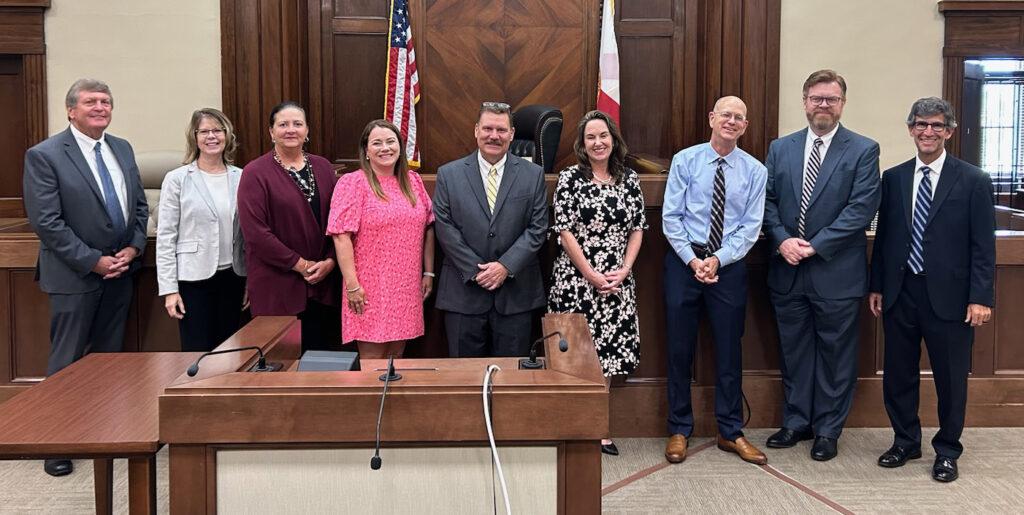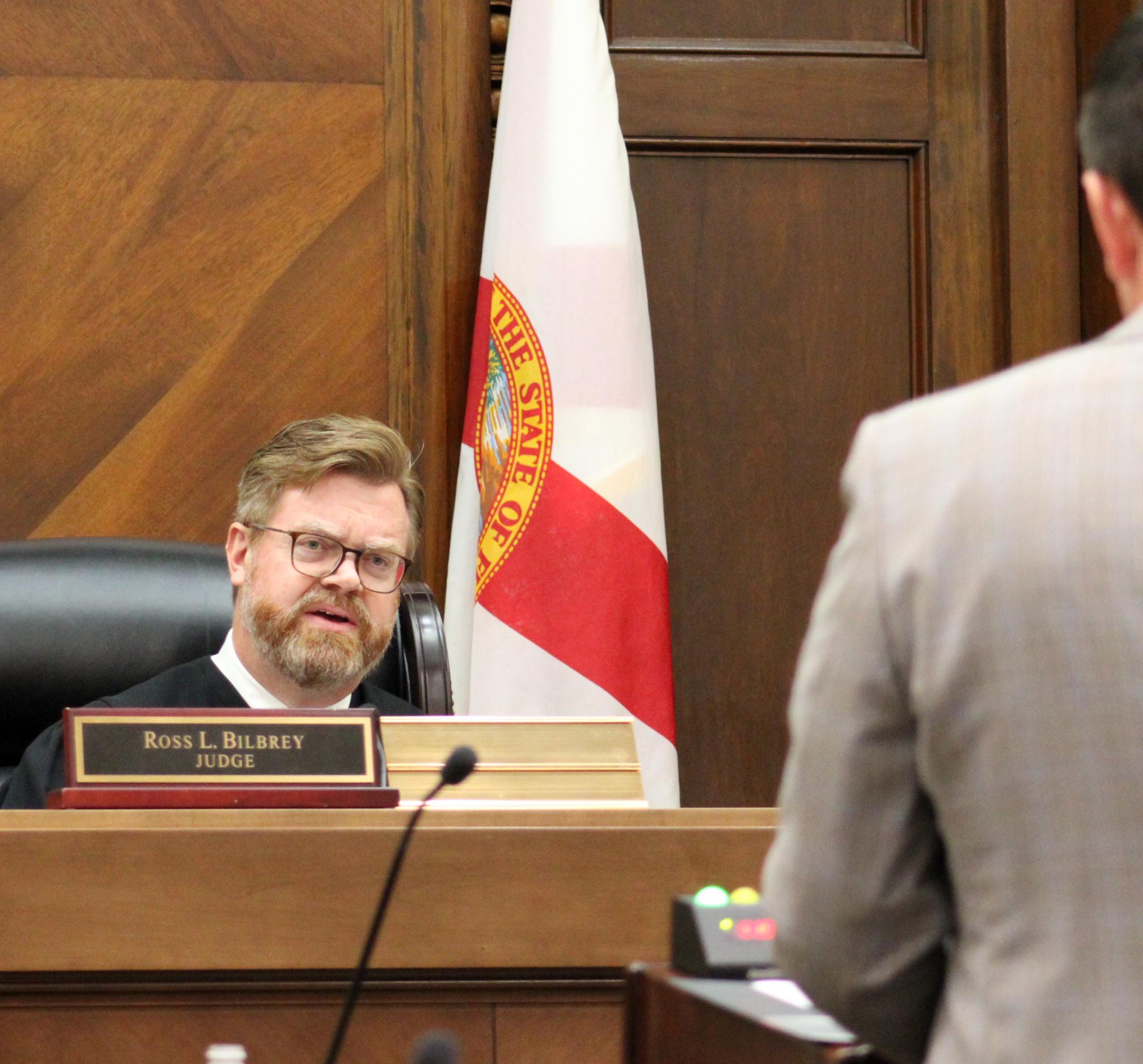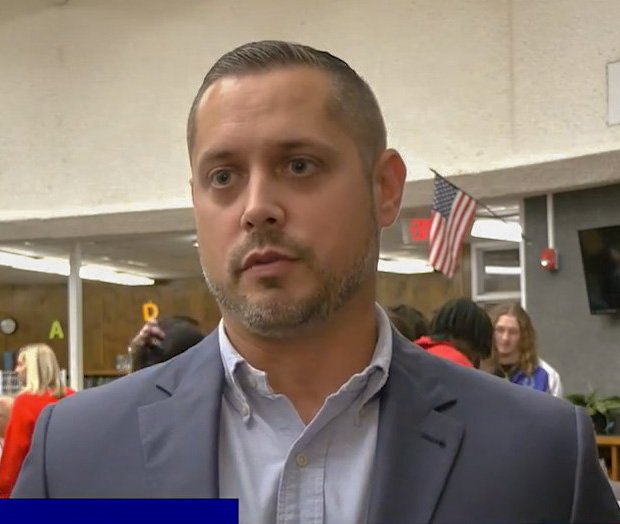1st DCA pays a visit to Apalachicola
It was a rare occurrence last week when the 1st District Court of Appeals took its show of jurisprudence on the road, and into the third floor courtroom of the Apalachicola courthouse.
As it turned out the three judges selected to hear the cases – 1st District Court of Appeals Judges Ross Bilbrey, Rachel E. Nordby and Adam Scott Tanenbaum – heard only one of the two cases before them on Wednesday afternoon, June 28.
The second one, a case involving a divorce dispute, had to be rescheduled because the clerk of courts in the county where it originated had failed to notify one of the attorneys where and when the court proceedings would be conducted.
The first case, though, was a fascinating criminal case, in which the appellate attorney, Luke Newman from Tallahassee, was arguing that the mistakes made by the circuit judge in Leon County with the case were so problematic as to warrant a new trial.
According to a statement of facts in the case, the defendant Malcolm Cooper was charged with several felonies including arson, arising out of a confrontation he had with an occasional girlfriend.
At trial, the state had called only the girlfriend and an officer who had responded to the emergency call. “The girlfriend’s account was difficult to follow,” wrote Newman. “She described an early-morning violent attack followed by hanging out and watching television, showering, and calling the police later that afternoon. The responding officer’s testimony repeatedly and substantially contradicted the girlfriend’s account.”

Cooper testified that he had argued with his girlfriend, but had not struck her nor started any fire. When the jurors asked to take an overnight recess, the judge raised the idea of reading an Allen instruction, which is intended to prevent a hung jury by encouraging jurors in the minority to reconsider. Despite defense counsel telling the judge that Cooper was not asking for the Allen instruction, the trial judge brought in the jurors and read the instruction.
“The jurors then returned with a note that the trial court could not understand,” wrote Newman. “The trial court brought the jury in the courtroom and read their verdict form. The trial judge then immediately instructed the jurors to select two options as to the burglary count.”
In reading the jury verdict, the judge said Cooper had been found guilty of battery and criminal mischief and after being polled, the jurors confirmed that this was their verdict (and) were then thanked and discharged.
The trial judge then claimed Cooper had been convicted of a first-degree felony punishable by life in prison, and after both the State and defense counsel asked if that was the case, the judge erroneously claimed that was what he had announced and defense counsel moved for a mistrial.
The state then asked if the former, discharged jurors could be found and returned to the courtroom and defense counsel objected.”The former jurors had been discharged. They were no longer jurors,” Newman wrote. “The trial court then, after an unknown period of time, ordered the bailiffs to bring the former jurors back into the courtroom.”
At that time, the trial judge apologized to the former jurors and explained he may have mispronounced what was on the actual verdict form. The trial judge had read that the jurors had found Cooper guilty of burglary, and of criminal mischief, and that they had found that, during the burglary, he had committed a battery.
At a later sentencing hearing, the State presented evidence that Cooper qualified for a statutory, recidivist sentencing scheme, where the only lawful sentence for burglary with a battery was mandatory life in prison.
“This argument ignores Cooper’s constitutional right to have his jury left alone in order to decide his fate without interference from the trial judge,” Newman argued. “The jurors in this case were determining matters which related to how Cooper would live the remainder of his natural life. There was never any objective indication that the jury was deadlocked or experiencing difficulties. The State does not suggest there is any established manner to gauge how long a jury should fairly deliberate the outcome of a criminal case.”





Meet the Editor
David Adlerstein, The Apalachicola Times’ digital editor, started with the news outlet in January 2002 as a reporter.
Prior to then, David Adlerstein began as a newspaperman with a small Boston weekly, after graduating magna cum laude from Brandeis University in Waltham, Massachusetts. He later edited the weekly Bellville Times, and as business reporter for the daily Marion Star, both not far from his hometown of Columbus, Ohio.
In 1995, he moved to South Florida, and worked as a business reporter and editor of Medical Business newspaper. In Jan. 2002, he began with the Apalachicola Times, first as reporter and later as editor, and in Oct. 2020, also began editing the Port St. Joe Star.